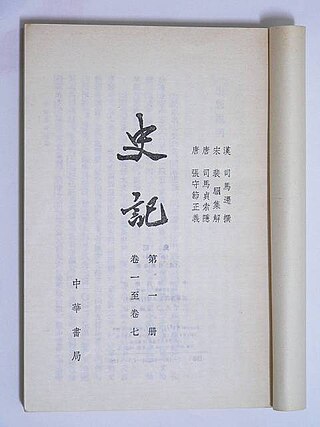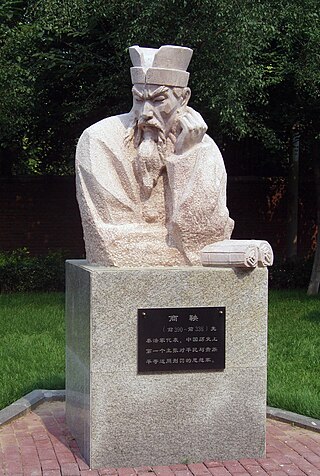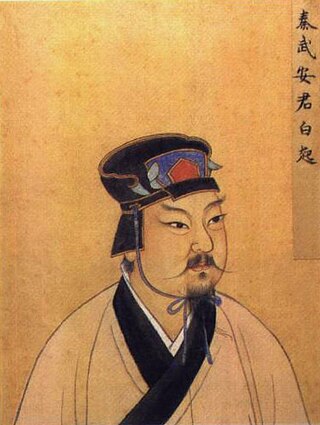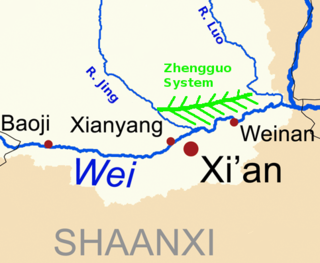
Qin Shi Huang was the founder of the Qin dynasty and the first Emperor of China. Rather than maintain the title of "king" borne by the previous Shang and Zhou rulers, he assumed the invented title of "emperor", which would see continuous use by monarchs in China for the next two millennia.

Records of the Grand Historian, also known by its Chinese name Shiji, is a monumental history of China that is the first of China's Twenty-Four Histories. The Records were written in the late 2nd century BC to early 1st century BC by the historian Sima Qian, whose father Sima Tan had begun it several decades earlier. The work covers a 2,500-year period from the age of the legendary Yellow Emperor to the reign of Emperor Wu of Han in the author's own time, and describes the world as it was known to the Chinese of the Western Han dynasty.

Jing Ke was a youxia during the late Warring States period of Ancient China. As a retainer of Crown Prince Dan of the Yan state, he was infamous for his failed assassination attempt on King Zheng of the Qin state, who later became Qin Shi Huang, the Qin Dynasty's first emperor. His story is told in the chapter titled Biographies of Assassins (刺客列傳) in Sima Qian's Records of the Grand Historian.

Fajia, often translated as Legalism, was a school of thought from classical Chinese philosophy. It represents several branches of thought of early thinkers mainly from the Warring States period, such as Guan Zhong, Li Kui, Shen Buhai, Shang Yang, Shen Dao, and Han Fei, whose reform ideas contributed greatly to the establishment of the bureaucratic Chinese empire. With an influence in the Qin, it formed into a school of thought in the Han dynasty. The Qin to Tang were more characterized by its tradition.
Qin Er Shi was the second emperor of the Qin dynasty from 210 to 207 BC. The son of Qin Shi Huang, he was born as Ying Huhai. He was put on the throne by Li Si and Zhao Gao, circumventing Fusu, Ying's brother and the designated heir. Upon Ying's ascension, both Fusu and the popular general Meng Tian were killed on the orders of Li and Zhao, with Qin Er Shi's role in the assassinations remaining uncertain and controversial. A weak ruler, Qin Er Shi's reign was completely dominated by Zhao Gao, who eventually forced him to commit suicide. By the time of his death, the Qin Empire's power had lessened so much that his successor Ziying ruled as a king, not emperor.

Shang Yang, also known as Wei Yang and originally surnamed Gongsun, was a statesman, chancellor and reformer of the State of Qin. Born in the Zhou vassal state of Wey during the Warring States period, he took up office in the Qin state, where his policies laid the administrative, political and economic foundations that would eventually enable Qin to conquer the other six rival states, unifying China into a centralized rule for the first time in history under the Qin dynasty. Scholars consider it likely that both he and his followers contributed to The Book of Lord Shang, a foundational philosophical work for the school of Chinese legalism.

Qin was an ancient Chinese state during the Zhou dynasty. It is traditionally dated to 897 BC. The Qin state originated from a reconquest of western lands that had previously been lost to the Xirong. Its location at the western edge of Chinese civilisation allowed for expansion and development that was not available to its rivals in the North China Plain.
Ziying, King of Qin was the third and last ruler of the Qin dynasty. He ruled over a fragmented Qin Empire for 46 days, from mid-October to early December 207 BC. He is referred to in some sources with the posthumous name Emperor Shang of Qin (秦殤帝) although Qin abolished the practice of posthumous names.

Bai Qi, also known as Gongsun Qi (公孫起), was a Chinese military general of the Qin state during the Warring States period. Born in Mei, Bai Qi served as the commander of the Qin army for more than 30 years, being responsible for the deaths of over one million, earning him the nickname Ren Tu. According to the Shiji, he seized more than 73 cities from the other six hostile states, and to date no record has been found to show that he suffered a single defeat throughout his military career. He is regarded by Chinese folklore as one of the four Greatest Generals of the Late Warring States period, along with Li Mu, Wang Jian, and Lian Po; he is also remembered as the most fearsome amongst the four.
King Huiwen of Qin, also known as Lord Huiwen of Qin or King Hui of Qin, given name Si (駟), was the ruler of the Qin state from 338 to 311 BC during the Warring States period and likely an ancestor of Qin Shi Huang. He was the first ruler of Qin to style himself "King" (王) instead of "Duke" (公).

The Zhengguo Canal, Zhengguoqu or Chengkuo Canal, named after its designer, Zheng Guo, is a large canal located in Shaanxi province, China. The canal irrigates the Guanzhong plain, north of Xi'an. Together with the Dujiangyan Irrigation System and Lingqu Canal, it is one of the three biggest water conservation projects built before the Qin dynasty in ancient China. The canal connects the Jing river and Luo river, northern tributaries of the Wei River.

The burning of books and burying of scholars was the purported burning of texts in 213 BCE and live burial of 460 Confucian scholars in 212 BCE ordered by Chinese emperor Qin Shi Huang. The events were alleged to have destroyed philosophical treatises of the Hundred Schools of Thought, with the goal of strengthening the official Qin governing philosophy of Legalism.
Qin Dongya is a female Chinese judoka who competed in the 2004 Summer Olympics and won a bronze medal in the middleweight (–70 kg) class.

The Epang Palace was a Chinese palace complex built during the reign of Qin Shi Huang, the first emperor of China and the founder of the short-lived Qin dynasty. It is located in western Xi’an, Shaanxi Province. Archaeologists believe that only the front hall was completed before the capital was sacked in 206 BCE.

The Mausoleum of the First Qin Emperor is the mausoleum of Qin Shi Huang, the first emperor of the Qin dynasty.
Duke Wen of Qin was the seventh ruler of the Zhou Dynasty state of Qin that eventually united China to become the Qin Dynasty. His ancestral name was Ying, nomen not known,and Duke Wen was his posthumous title.
Duke Xian I of Qin was from 715 to 704 BC the eighth ruler of the Zhou dynasty Chinese state of Qin that eventually united China to become the Qin dynasty. His ancestral name was Ying, Personal Name is Li,and Duke Xian was his posthumous title. His title was recorded as Duke Ning of Qin (秦寧公) in the Records of the Grand Historian by Han dynasty historian Sima Qian, but inscriptions on excavated bronzes from the era have proven that "Ning" (寧) was a miscopy of the correct character "Xian" (憲).
Duke Wu of Qin was from 697 to 678 BC the tenth ruler of the Zhou Dynasty state of Qin that eventually united China to become the Qin Dynasty. His ancestral name was Ying ,Shuo is his personal name and Duke Wu was his posthumous title.
Duke Jian of Qin was, from 414 to 400 BC, the 26th ruler of the Zhou Dynasty Chinese state of Qin that eventually united China to become the Qin Dynasty. His ancestral name was Ying, and Duke Jian was his posthumous title.
This is a family tree of Chinese monarchs during the Warring States period.









